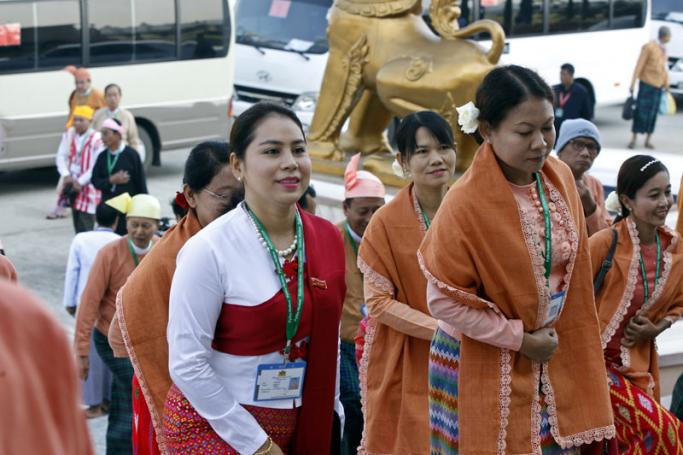Myanmar MP Wint Wah Tun cradles the baby she named “Parliament” and explains why she shrugged off conservative attitudes to enter parliament as part of a flood of new women lawmakers for Aung San Suu Kyi’s pro-democracy party.
While she thought hard about whether to stand for election while pregnant with her son, who was born just days before she took her seat, she “cannot accept” the traditional notion that women should give up their career dreams after they become mothers.
“We are perfectly capable,” the 30-year-old told AFP, adding she was determined to try to help bring peace to her conflict-torn eastern Kayah state constituency.
“Wherever in the world, armed conflicts break out between men. Women and mothers are caught in the crossfire of men’s fighting,” she said.
Wint Wah Tun is one of dozens of women MPs for Suu Kyi’s National League for Democracy who followed the country’s most revered female politician into parliament in the heart of Myanmar’s junta-built capital after the country’s freest elections in generations.
Women now make up 14.5 percent of the combined national parliament, a dramatic increase from the previous legislature — the country’s first after the end of outright military rule — which had the lowest percentage in Asia with just 5.9 percent, according to the Asia Foundation’s Myanmar representative Kim N B Ninh.
- Increased opportunity –
Despite following in the footsteps of “the Lady” as Suu Kyi is known in Myanmar, many female MPs suffer from a lack of confidence.
A 2015 survey of women in the former parliament suggested they “perceive themselves as being less qualified than they actually are, a perception reinforced by the lack of respect and trust afforded to women in positions of leadership by the society around them,” Ninh said in a recent article.
Thandar, a writer and former political prisoner, has needed more confidence than most to sit in a legislature that retains a 25 percent bloc of unelected soldiers.
The 47-year-old has waged a spirited campaign for the army to hold someone accountable for the death of her husband Pargyi, a freelance reporter who was shot dead while in military custody in a restive eastern region in 2014.
She is the only woman on parliament’s new committee for citizenship rights.
“I have asked them not to leave me behind because of I’m a woman. I told them not to think I cannot work. I’m capable. I told them that I will work double if there is someone who is sick in the group. I told them like this with my worry if they leave me being as a woman,” she told AFP.
Myanmar is in the grips of sweeping changes as it opens to the world following the end of decades of junta rule in 2011.
Those changes have meant increased opportunities for women, with greater freedoms and employment.
But there have also been significant setbacks, with the army-backed government of President Thein Sein bowing to Buddhist nationalist pressure to push through a raft of controversial laws governing birth spacing and inter-faith marriage that were slammed by rights groups as discriminatory to women and religious minorities.
A recent editorial in the state-backed Global New Light of Myanmar exhorted women to marry early and have more children.
The article was released just as the United Nation’s Population Fund released an open letter in local newspaper the Myanmar Times urging the country to prioritise adolescent girls, “whose ability to achieve their full potential can alter the future course of the country”.
© AFP
You are viewing the old site.
Please update your bookmark to https://eng.mizzima.com.
Mizzima Weekly Magazine Issue...
14 December 2023
New UK Burma sanctions welcome...
13 December 2023
Spring Revolution Daily News f...
13 December 2023
Spring Revolution Daily News f...
12 December 2023
Spring Revolution Daily News f...
11 December 2023
Spring Revolution Daily News f...
08 December 2023
Spring Revolution Daily News f...
07 December 2023
Diaspora journalists increasin...
07 December 2023
Myanmar migrant workers arrested in Mae Sot












